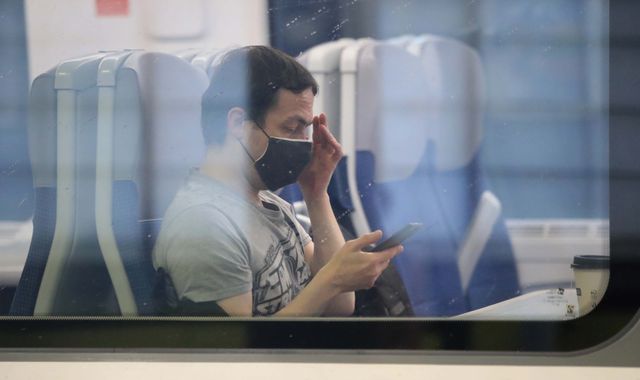COVID-19: Row as government bids to avoid ‘mini-exams’ in awarding of A-level and GCSE grades
Written by News on 25/02/2021
Teachers will be able to use questions set by exam boards to help determine A-level and GCSE grades for students in England – but they will be optional as the government tries to avoid “mini-exams” this summer.

Gavin Williamson announced in January that exams would be scrapped this summer due to the COVID-19 pandemic.
Pupils will return to the classroom from 8 March as lockdown is eased, with the government on Tuesday announcing extra support to help children catch up on lost learning.
Live COVID updates from the UK and around the world
Now the education secretary has set out more details on how the revised assessment process will work for results this summer.
This includes:
- A-level students will get their results on 10 August, while GCSE pupils will get their grades on 12 August. These earlier dates will allow more time for students to appeal their grades, if they believe they are unfair.
- Pupils will be able to appeal their grades at no additional cost and will have the chance to sit exams in the autumn if they are still unhappy with their marks.
- Teachers will be provided with optional assessment questions for students to answer in order to help them decide what grades should be awarded. However, the assessments are not expected to take place under exam conditions. Teachers will have the flexibility to choose how long students will have to complete the task and where it will be carried out.
- Teachers will be able to base students’ grades on a range of evidence, including mock exams, coursework, essays and in-class tests.
- Grades will have to be submitted to exam boards by 18 June, with quality assurance checks then taking place.
- Teachers will be given guidance on how to make judgments before the Easter holidays.
- Those studying for vocational and technical qualifications will also get teacher-assessed grades rather than having to sit exams.
There was controversy last summer when an algorithm downgraded the results of thousands of students, before it was eventually scrapped.
This time round however, exams regulator Ofqual will not use an algorithm to standardise estimated grades if they appear to be more generous than they should be.
It was confirmed on Thursday that Sir Jon Coles, a former director-general of the Department of Education, had resigned from Ofqual in disagreement with the way grades are to be awarded this summer.
Sir Jon, who sat on Ofqual’s seven-member “recovery committee” to oversee the watchdog’s recovery from last year’s exams fiasco, recently accused the government of being “desperate not to be accused of having ‘an algorithm’ or of ‘exams by the back door'”.
He added on Twitter last month: “Focusing on this, rather than the actual goal – how we are going to be fair to young people – risks an outcome in August much worse than last year’s.”
Confirming Sir Jon’s resignation, schools minister Nick Gibb told Sky News: “He thought that the exam material that we’re making available to teachers – the question banks they can use as part of the range of evidence that they’ll need to supply to exam boards about how they’ve devised a grade – he wanted that to be compulsory and mandatory.”
But the government didn’t want questions set by exam boards to be regarded as a “mini-exam” and a consultation on how to award grades this summer also found they “should be an option and not mandatory”, Mr Gibb said.
“We’ve cancelled exams this year because they were felt to be unfair, given the disruption, so we didn’t want to then cancel exams and then replace them with another exam,” he added.
According to the Department for Education, schools and colleges will conduct numerous checks to ensure their grade estimates are as fair as possible, along with the exam boards.
Mr Gibb said: “It’s the best we can do other than exams. Exams this year wouldn’t be fair because of the different levels of disruption that students have faced across the country.
“We trust the professionalism of teachers and headteachers. We consulted very widely on 15 January for two weeks on the basis of these details and we had 100,000 responses – half of whom were students.
“This method has achieved widespread support in the sector.”
Mr Gibb admitted the government had been “determined to keep exams” up until England’s third national lockdown began in January, when it was decided the new disruption made teacher-assessed grades “the only fair system”.
But he added it was “not an ideal situation to be in”.
Mr Williamson is due to set out the details of this year’s method of awarding grades to the House of Commons later on Thursday.
“Young people have shown incredible resilience over the last year, continuing with their learning amidst unprecedented challenges while the country battles with this pandemic. Those efforts deserve to be fairly rewarded,” the education secretary said.
“That’s why we are providing the fairest possible system for those pupils, asking those who know them best – their teachers – to determine their grades, with our sole aim to make sure all young people can progress to the next stage of their education or career.”
Ofqual’s interim chief regulator Simon Lebus said: “The aim is to make it no harder overall for this year’s students to receive a particular grade than students in other years.”
Labour’s shadow education secretary Kate Green said the “delayed announcement of the replacement for exams has created needless stress for pupils, parents and teachers”.
“Gavin Williamson created chaos last summer and this cannot be allowed to happen again,” she said.
“The government must now set out the detail schools and colleges need to ensure every pupil receives fair grades which enable them to move onto the next stage of their education, training or employment.”
John Nield, a former chief examiner with the AQA exam board, warned that teachers will be left to “take all the flak from parents” over the awarding of grades this summer.
“The government are just washing their hands of the whole thing – putting it in the hands of teachers and expecting teachers, with no training, to get on with this,” he told Sky News.
But Paul Whiteman, general secretary of the school leaders’ union NAHT, said the arrangements “appear to chart a path which avoids the awful chaos of last year”.
He continued: “This set of decisions is, however, only the starting point. It is now down to the awarding bodies to provide the detail which schools and colleges need to implement the process.
“Although earlier results for students seeking to start university could be beneficial, cramming GCSE results into the same week will place unnecessary pressure on to the system.”
Mary Bousted, joint general secretary of the National Education Union, also gave a cautious welcome to the plans.
“However, there are still question marks over how it is expected that the extra work necessary to facilitate grading will be dealt with,” she said.
“Substantial time will need to be set aside for the initial assessments and gradings and then the internal school moderation processes.
“It may well be that extra staff need to be employed to release teachers for this important work.”
(c) Sky News 2021: COVID-19: Row as government bids to avoid ‘mini-exams’ in awarding of A-level and GCSE grades







